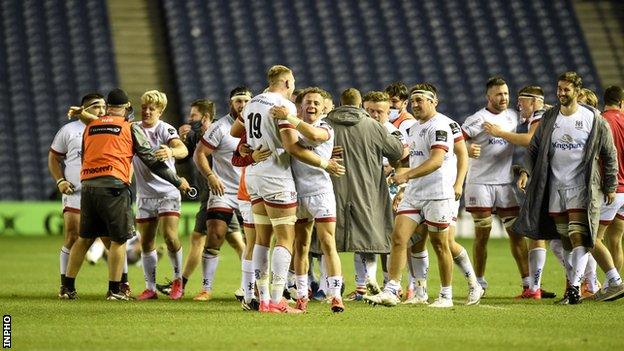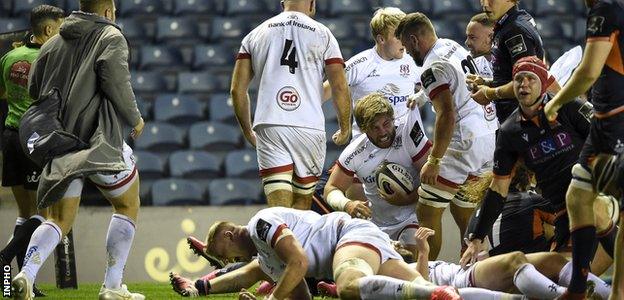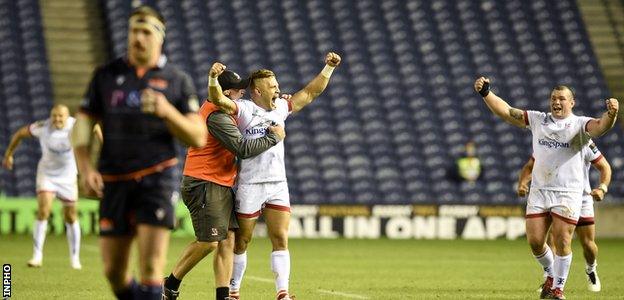Pro14: Ulster pass resilience test with significant semi-final win over Edinburgh
- Published

Ulster twice found themselves 12 points down in the second half at Murrayfield but came back to win
After a dramatic Pro14 semi-final victory, Dan McFarland rowed back on his own verdict - having deemed himself to have gone too far in praising Ulster's second-half revival against Edinburgh.
"I thought we were excellent in the second half," the head coach said before pausing.
"Sorry, not excellent. A lot better in the second half."
Ten minutes earlier, Ulster captain Billy Burns had also moved to bring what was undeniably the province's most exhilarating win of the season - 22-19 over Edinburgh, having been 12 points down - back into context.
"It was a huge effort. But we've got to keep our feet on the ground because nobody remembers semi-final winners."
Through the disappointment and delight experienced in recent weeks, there has been a determination among Ulster's players and coaches to see every result through the same lens, where the end goal remains unchanged.
But while the result of next week's Pro14 final against Leinster will, one way or another, be of even more significance to Ulster, Saturday's semi-final win over Edinburgh was a statement in its own right, and one borne out of two years of work since McFarland arrived in Belfast.
A win owed to resilience and depth
The second half at Murrayfield saw McFarland's 'fight for every inch' mantra marry Ulster's strength-in-depth, which is arguably greater now than it has been at any point in the last decade.
Few people who have kept up with the province's fortunes in the past three years would have predicted that their most important comeback of that time would come with John Cooney off the field.
Cooney was a casualty of Ulster's inability to break Edinburgh open in the first half and was replaced by Alby Mathewson for the second period.
The former All Black was the first replacement to start pulling the flow of the game into Ulster's favour, picking up the pace of their attack and directing the traffic as the province began to throw caution to the wind in search of an opening.

Ulster's replacement hooker John Andrew scored the province's third try of the second half as the visitors drew level
Then came replacement props Marty Moore and Jack McGrath, edged out of the starting line-up by former Academy duo Tom O'Toole and Eric O'Sullivan.
Suffice to say that when you have a pair of Ireland internationals, and in McGrath's case a Lion, coming off the bench, the front row should be capable of making an impact for the full 80.
And, of course, there was Ian Madigan. Whose eight minutes of action were less a cameo and more a match-winning intervention.
Since rugby's return Madigan and Burns have both insisted there is enough space for both fly-halves to thrive at Ulster while furthering their international aspirations in unison.
Indeed both 10s came up big in key moments during Saturday's win, with Burns scrambling to make a crucial interception to deny Edinburgh a probable third try that would have seen them extend their lead to 19-0.

Madigan sent Ulster into their first final since 2013 with the last kick of the game
Like Mathewson and Cooney at scrum-half, Ulster fans will hope that the semi-final win was evidence of a system in which the team can benefit from two strong fly-half options as opposed to the situation creating tension over McFarland's preferred pecking-order.
"Those guys [Mathewson and Madigan] have played in big games, they've played for some of the best sides in the world," said Burns.
"If we can squeeze everything out of them, we will - and they're both willing to do it. Both of them have come in and they've offered a huge amount.
"There's no ego or anything like that. They've proved again the impact they have.
"They offer a lot in meetings, they talk a lot. With Mads, I get a lot of information from him."
Mental challenge of winning away semi-final 'huge'
Only the players will be able to tell us how truly significant the win is.
Defeating Edinburgh at Murrayfield is something that most of the Ulster squad have done before so it is partially understandable that Burns and McFarland's response to the result was one of satisfaction over elation.
However given what was at stake and what has come before, it is hard to believe that the magnitude of the win will be entirely brushed over.
The significance of the result comes from the fact that Ulster found themselves with their backs against the wall in an away semi-final, two scores down and facing another knockout defeat. But this time, unlike in six of their seven most recent knockout matches, they found a way to win.
Surely that, even to a squad as drilled in mental resilience as this Ulster side, is tantamount to the smashing of a glass ceiling.
"The mental challenge of going away and winning in a semi-final is huge," said McFarland.
"I'd say it's also a lot to do with our mindset going into the second half, particularly when things started going against us at the start."
It is not the prize Ulster came for at the start of the season, nor is it the one they will settle for with a final against the undefeated Leinster to come next week.
However the manner of the victory, with what was on the table, makes it a particularly significant moment in the growth of the province.